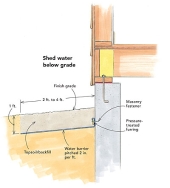
 1
1












Living in Anjou , France,
For the many not for the few
http://www.permies.com/t/80/31583/projects/Permie-Pennies-France#330873
 1
1












"Think of your mind as a non-linear system that you constantly have to train"













"Never doubt that a small group of thoughtful, committed citizens can change the world; indeed, it's the only thing that ever has."-Margaret Mead "The only thing worse than being blind, is having sight but no vision."-Helen Keller














"Never doubt that a small group of thoughtful, committed citizens can change the world; indeed, it's the only thing that ever has."-Margaret Mead "The only thing worse than being blind, is having sight but no vision."-Helen Keller
 1
1




Matu Collins wrote:Yep, you're a digging machine, Dale.
Today I heard about a study that said that sitting down all day is exceptionally bad for your heart health. I guess you will be ok.






Roberto pokachinni wrote:
I hope for your sake and the owners, that the basement was not purposefully remodeled for the sale, with full knowledge of a serious water problem. I once bought a truck with a leak. (wow that sounds like a bad joke already) When it rained hard water pooled on the floor. When I bought the truck it was in a barn. They said they were keeping it out of the weather, all polished and nice for the sale. What a lemon! That was the beginning of a long nightmare adventure with that truck. I wanted to drive it right through their house!
Moderator, Treatment Free Beekeepers group on Facebook.
https://www.facebook.com/groups/treatmentfreebeekeepers/















 1
1




"Never doubt that a small group of thoughtful, committed citizens can change the world; indeed, it's the only thing that ever has."-Margaret Mead "The only thing worse than being blind, is having sight but no vision."-Helen Keller


















"Never doubt that a small group of thoughtful, committed citizens can change the world; indeed, it's the only thing that ever has."-Margaret Mead "The only thing worse than being blind, is having sight but no vision."-Helen Keller
 1
1




 1
1
























Success has a Thousand Fathers , Failure is an Orphan
LOOK AT THE " SIMILAR THREADS " BELOW !




 1
1





Subtropical desert (Köppen: BWh)
Elevation: 1090 ft Annual rainfall: 7"




Jennifer Wadsworth wrote:Is that a "Cranky Old Guy" changing station behind you?
 1
1




 1
1




 1
1












Rufus Laggren wrote:Sounds like he got a great deal from you. In his place I'd have insisted you do the rest of it by hand. <g>
Wishing him luck w/the drainage. Water's really sneaky and persistent.
Rufus
 2
2
















Jay C. White Cloud wrote:I guess in a more direct and succinct answer I would say "professionals" work by a set contract, and "machines, or "the unknowing" work time and materials...
 1
1








 1
1




"If you want to save the environment, build a city worth living in." - Wendell Berry
 2
2








Brian Knight wrote:Dale, been following this project with interest. Great work! I absolutely agree that underground drainage should reduce the amount of water flowing through it as much as possible as it does get clogged over time. Well maintained gutters can go a long way to preventing problems.
I thought of your project this AM reading the latest JLC on a less-invasive excavation strategy. Hear is the link to the related study document and it talks about the method on page 19,20 which they call Air vaccum and hydro slot trenching; basically a pressure washer and big shop vac. The link unfortunately has no pics like the article did..
http://apps1.eere.energy.gov/buildings/publications/pdfs/building_america/excavationless_exterior_found.pdf




Rufus Laggren wrote:> lead by example...
That usually seems to work well.
But I agree w/J: Once you get a feel for a type of work and establish (to yourself) your capabilities (and those of others), flat rate or bid saves a HUGE amount of time and hassle/"misunderstanding". The key being to clearly define the deliverables (results) and any general or particular criteria for that matter to the customer (ie. particular types of materials, methods, etc). The criteria don't need to be absolutely detailed - "good workmanlike" and "standard industry practice" are commonly useful; though not particularly relevant to specific details they become meaningful when applied to the job as a whole. Then one must monitor results regularly and recognize good/bad work.
Attitude matters a whole lot more than immediate skill. I once fired a big strong guy because I couldn't figure out how to make him worth any pay. I realized I can't afford to hire a body w/out a mind actively expediting the work. The worker needs to actually be willing and _try_ to do _your_ job well or he becomes a liability, a serious risk. The trick is to make "your" plural.
Rufus

| I agree. Here's the link: http://stoves2.com |




